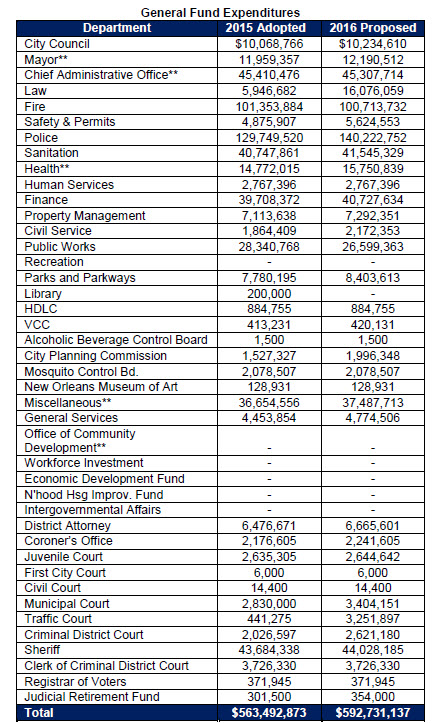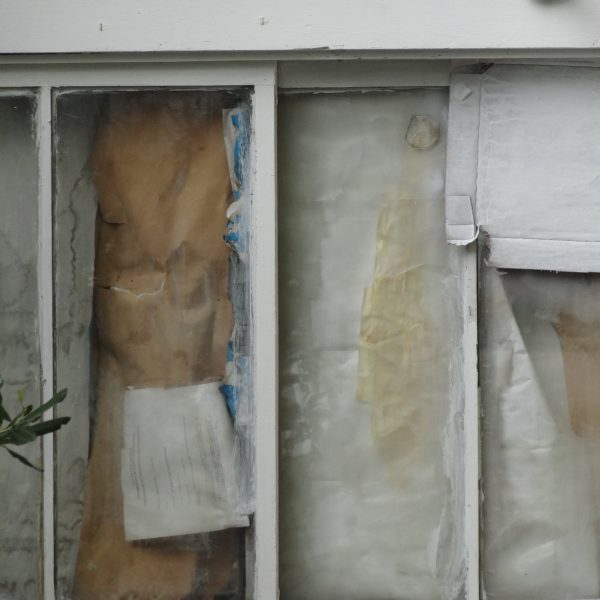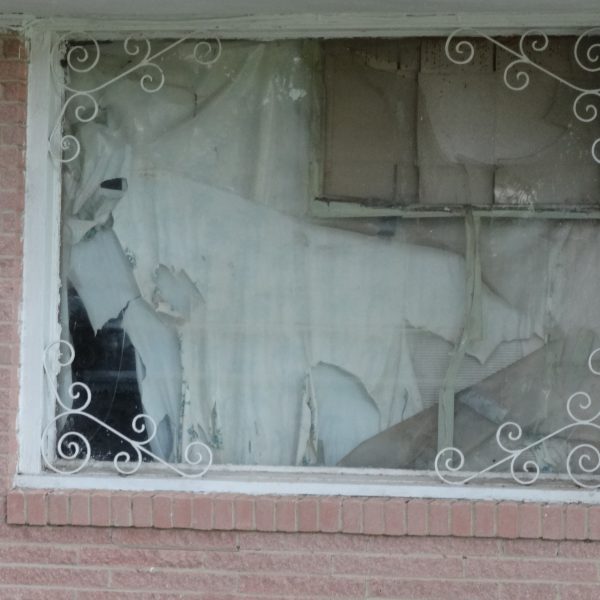It's not a conspiracy, but the result is the same: New Orleans still has thousands of blighted houses. What it can be called is a dysfunctional system that created an organized effort that actually encourages blighted property, and uses your tax dollars to take away your tax dollars. The effect of thousands of blighted properties is two-fold: one, a loss of property taxes, which could be used to fund more police, fire protection and schools, and, two, a reduction in property values which takes money out of your pocket when you sell your property.
How big a problem is blighted property? It's underestimated. In my 15 years of working to put vacant property back into commerce, I estimate there are 20,000 to 40,000 blighted properties and vacant lots remaining that, if put back into commerce, would provide enough property tax income to triple the size of the police force. New Orleans could be known all over the world for almost eliminating crime.

After Katrina, thousands of homes were in need of repair, so holding property owners accountable was a priority low on the totem pole. Mayor Ray Naquin's administration would not allow fines for code violations on blighted properties. The mayor did not want to lose voters.
The fines would actually encourage owners to cut the grass and repair their properties, and, if not, allow the city to sell the property if went unpaid which would put the property into the hands of someone who would care for the property and revitalize the neighborhood. The city wins, the neighborhood wins, and the owner gets relief from maintenance they cannot afford and gets the money to put into things about which they do care.
This is one of the few things we expect government to do: make the world better for individuals by doing things that individuals cannot do, such as build a massive highway system from one coast to the other. We saw this process work in the 1956 when President Eisenhower signed the Federal-Aid Highway Act, a $500,000,000 highway rebuilding program that resulted in major highways across the nation. Traveling for vacation was easier, owning a home in the suburbs was affordable, trucking transportation costs declined, and goods got where they needed to go faster. In order for the government to build highways, they needed to force some private property owners to sell their property. Three appraisals were required so that the owner received a fair price.
The same process was utilized with property owners on Tulane Avenue, when the Veterans Administration and LSU hospitals were built and private property owners were forced to sell their property. Individual rights of property ownership were denied in order to create a public good. You want it to happen only in rare occasions, but it can work to make your neighborhood better.
 The Lakeview Civic Improvement Association back in 2009 deemed one house to be a problem. The house had no electricity, even 4 years after Katrina, and the foundation was crumbling in disrepair with gaping holes big enough for rodents to live and breed and threaten nearby children playing in their own yard. The owners lived in another state and had no interest in repairing the property, but did have the resources to hire an attorney and fight the city.
The Lakeview Civic Improvement Association back in 2009 deemed one house to be a problem. The house had no electricity, even 4 years after Katrina, and the foundation was crumbling in disrepair with gaping holes big enough for rodents to live and breed and threaten nearby children playing in their own yard. The owners lived in another state and had no interest in repairing the property, but did have the resources to hire an attorney and fight the city.
The Lakeview Civic Improvement Association has a process regarding blighted property, which starts with notifying the city by calling 311, the city’s catch-all service number. A complaint was filed for violating city codes, and the Code Enforcement Department researched the issue. Code Enforcement officers visited the property and determined there were violations, then assigned a case number and a hearing was set to address the violations with the owners. The blighted house has been inspected by Code Enforcement 5 times since 2009 and found to have a total of 37 violations, and none have been addressed by property owners.
 On August 27, 2009, the first hearing occurred. The hearing took place at the Code Enforcement Department office at 1350 Poydras Street. Present were the hearing officers, 1 or 2 people who are employees of the Code Enforcement Department, looking out for the residents and enforcing the city housing laws. Also present were the homeowners or their attorney. There was a stenographer taking notes. At this first meeting, the hearing officer decided to “reset” the meeting, which means nothing happens and it is delayed. Everything is on hold to give the homeowner a chance to correct the code violations.
On August 27, 2009, the first hearing occurred. The hearing took place at the Code Enforcement Department office at 1350 Poydras Street. Present were the hearing officers, 1 or 2 people who are employees of the Code Enforcement Department, looking out for the residents and enforcing the city housing laws. Also present were the homeowners or their attorney. There was a stenographer taking notes. At this first meeting, the hearing officer decided to “reset” the meeting, which means nothing happens and it is delayed. Everything is on hold to give the homeowner a chance to correct the code violations.
Two months later, on October 14, 2009, the 2nd hearing occurred. Present was the hearing officer and the homeowner. The case was again “reset”.
Two months later, on December 16, 2009, the 3rd hearing occurred, where the hearing officer issued a conditional guilty decision but “reset” the hearing. The judge waived over $15,000 in accumulated fines.
Three months later, on March 11, 2010, the 4th hearing occurred, and the hearing officer determined the homeowner was guilty of code violations and fined $574 plus $200 daily.
The property further fell into disrepair, with the owners refusing to pay property taxes, so the Sheriff’s office put the house up for sale, since the City had imposed liens for code violations which went unpaid. The sale was stopped at the last minute.
The Code Enforcement Department finally assigned a case number # 12-07481-PNBL, after Code Enforcement found 5 code violations during an inspection on October 8, 2012. Almost one year later, on August 20, 2013, the 5th hearing occurs and an officer with the Code Enforcement Department determined the owners were guilty, fined them $575 plus $500 daily, and the property deemed a public nuisance and blighted.
After additional complaints by the Lakeview Civic Improvement Association and neighbors, a 2nd case number # 14-02430-MPM was filed by the Code Enforcement Department after an inspection on April 30, 2014, found 6 violations, and a 6th hearing granted which determined there was no work in progress and the case was closed.
A 3rd case number, # 14-03102-MPM, was filed for 14 code violations, after a rodent living under the foundation attacked a child playing in her own yard. It turns out the owners were leaving food in their back yard for feral cats, which was also feeding the rodents. On September 4, 2014, a 7th hearing occurs where hearing officers determined the owners were guilty and fined them $1,694. On October 3, 2014, the property owners hired attorney Peter Derbes, who filed the 1st appeal #14-9692.
On April 21, 2015, a 4th case number, # 14-09909-MPM, was filed by Code Enforcement for 2 violations but no hearing was set because the hearing officer said the case was under appeal. On May 28, 2015, property owner’s attorney, Peter Derbes, filed a 2nd appeal, #15-5043. On September 25, 2015, City attorney, William Goforth, consolidated both appeals into a new hearing in Civil District Court. On October 1, 2015, Claudia Riegel, director of the New Orleans Mosquito, Rodent & Termite Board was notified by neighbors about property owners feeding rodents at the property.
An 8th hearing was scheduled for January 15, 2016 with Judge Kern Reese, Division L, but the hearing was rescheduled but no date set. On April 25, 2016, Code Enforcement inspectors found 10 violations and a 5th case # 16-01802-MPM was filed. A 9th hearing was set for June 16, 2016. The Code Enforcement officer had the authority to waive the daily fees, so the fines were reduced to $2,500.
 On June 9, 2016, Code Enforcement noticed there are several verdicts and appeals and agreed if there is a judgment as a result of the hearing on June 16th that it might not move forward until the appeals are resolved. Code Enforcement agents agreed to contact the appeals department across the street to find out why the appeals had not been resolved. Once a judgment to foreclose is decided by a hearing by the city due to unpaid city liens, city attorneys would be responsible for proceeding to have the property auctioned off. On June 13, 2016, Cherrel Taplin, Senior Chief Deputy District City Attorney, emailed participants that a hearing was scheduled for September 9, 2016.
On June 9, 2016, Code Enforcement noticed there are several verdicts and appeals and agreed if there is a judgment as a result of the hearing on June 16th that it might not move forward until the appeals are resolved. Code Enforcement agents agreed to contact the appeals department across the street to find out why the appeals had not been resolved. Once a judgment to foreclose is decided by a hearing by the city due to unpaid city liens, city attorneys would be responsible for proceeding to have the property auctioned off. On June 13, 2016, Cherrel Taplin, Senior Chief Deputy District City Attorney, emailed participants that a hearing was scheduled for September 9, 2016.
On June 16th, neighbors attended a 9th hearing at the Code Enforcement office, which was “reset” by code officers after discussing with Tammy Jackson, City Legal Advisor, because the owner’s attorney, Peter Derbes, produced a copy of an email stating he had talked with a code enforcement officer and that the hearing should not take place. This was contrary to information provided to the attending residents and the hearing officer. Residents met with Chad Dyer, Director of Code Enforcement, to discuss the blighted property and why it was granted appeals. Chad disclosed that he did not know why the property was appealed but if it was because of a problem in the City’s blighted process, it means the City has to give homeowners more than enough opportunity to fix the blighted property. Chad stated one significant issue occurred a few years ago and the cityy was found to be in violation of the blighted process and had to throw out 2,500 cases. He was concerned that if an attorney could prove the city's process was flawed, that the attorney could make the city pay his legal fees. Chad promised to research the reason for the appeals and reply to the residents. They never heard from him again.
The two appeals were heard in Civil District Court under Judge Kern Reese, who ruled that the city had only notified one property owner, not all three, and dismissed $2,500 in fines.